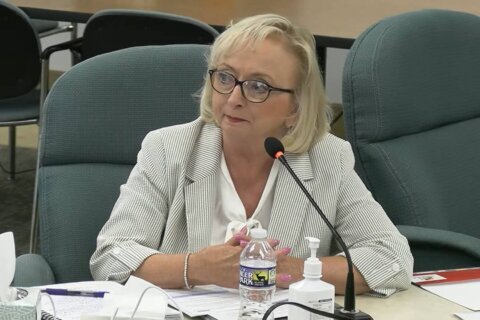This article was republished with permission from WTOP’s news partners at Maryland Matters. Sign up for Maryland Matters’ free email subscription today.
This content was republished with permission from WTOP’s news partners at Maryland Matters. Sign up for Maryland Matters’ free email subscription today.
Lawmakers began the legislative session considering a measure that would offer paid family and medical leave to all Marylanders, but a key House committee is now considering whether to instead a establish a commission that would work out the finer details of a statewide paid family and medical leave insurance program.
As originally introduced, House Bill 496, sponsored by Dels. C.T. Wilson (D-Charles), Kriselda Valderrama (D-Prince George’s) and Ariana Kelly (D-Montgomery), would have allowed all Marylanders, both part-time and full-time employees who have worked 680 hours in the past year, to take 12 weeks of paid leave following childbirth or to take care of themselves or a family member experiencing serious health issues.
Under the original bill, workers would have received a partial wage replacement of between $50 and $1,000 a week, depending on their salary. The program would work by establishing a statewide family leave insurance program, which would include contributions — split evenly by an employee and employer. However, self-employed individuals and employers with 14 employees or less would not be required to contribute to the fund.
But Wilson, the chair of the Economic Matters Committee, recently introduced an amendment that would strike all of the bill as originally introduced and replace it with a commission that would make recommendations on the specifics of a statewide paid family leave program, such as employment eligibility, when contributions should start, the cost sharing formula between employers and employees and any other aspects that the commission deems relevant.
Wilson defended this proposal as a necessary cautious step to ensure that the state can afford such a program.
“This is not a dilatory tactic — we’re not trying to kick the can down the road. We have an obligation here as elected officials and that’s to create good policy…not to jump at the first thing that comes on our plate,” Wilson told the committee on Monday.
HB 496 was on the list of bills up for a vote in the Economic Matters Committee on Monday, but Wilson said that the committee will vote on the measure and its proposed amendment on Wednesday.
To advocates, the proposed amendment is a repeat of what happened in 2016. Back then, the legislature attempted to pass a bill to establish a paid family leave program but it was similarly weakened to a task force to study and make recommendations for establishing such a program. In its 2017 report, the task force recommended that a Maryland paid family leave program be self-funded and include benefits for low-wage and part-time workers.
“We are vehemently opposed to an amendment that would push this process out yet another year for a completely unnecessary study — this issue has been studied to death,” said Clinton Macsherry, director of public policy for Maryland Family Network. “I think it’s really disingenuous for any legislative body to say we’re going to pass it this year, and then in fact pass another study group.”
But Wilson argued that this commission is different from the task force established in 2016.
“That was in 2017, so that was quite a while ago,” Wilson said. “I’m serious and intentional about this bill going through, but I want to make sure that we’re taking things in consideration as far as timing with inflation, gas, food and things of that nature.”
Del. Lily Qi (D-Montgomery) contended that this bill is “not just a study bill” but a move to consider the new economic dynamics over the past two years since the start of the COVID-19 pandemic. Now, more people are working from home and some have moved out of state to work remotely so it is critical to figure out which state law should apply to whom and which industry will be the most affected by a paid family leave mandate, Qi continued.
Minority Whip Christopher Adams (R-Middle Shore) said that it is important for any commission to study existing federal and state leave mandates to make sure business owners are not overburdened.
The amended bill states that the legislature’s intent is to set aside funds in fiscal year 2023 budget to implement a paid family and medical leave insurance program that Marylanders can benefit from starting January 2024, depending on the recommendations of the commission.
But that turnaround time is aggressive and sets the program up for failure, said Myles Hicks, campaign manager for Time to Care Maryland. He estimated that it will take at least 18 months of contributions for the program to become solvent.
Hicks also took issue with the composition of the commission, which he said left out advocates for children, mothers, seniors, people with disabilities and non-profit employers — who he claimed would benefit most from a paid family leave program.
The amended bill calls for a commission made up of lawmakers, state officials, business representatives, a national organization with expertise in family medical and leave insurance programs, a private sector labor union representative, a community organization that advocates for working families and an economist.
House and Senate lawmakers are headed in different directions on the long-sought legislation.
The Senate cross-file, sponsored by Sens. Antonio Hayes (D-Baltimore City) and Joanne Benson (D-Prince George’s), was amended in the Finance Committee to alter the split of contributions between workers and employers from an equal split to a 80-20 split, with employees contributing more to the fund.
If the contribution was split evenly, the cost that a worker earning $52,000 and that worker’s employer would have to contribute would be $3.35. But if the contribution was split 80-20, the cost for the worker would be $5.36 a week, according to Time to Care Maryland.
Wilson criticized this Senate amendment as untenable for Marylanders, especially if the state mandates a paid family leave insurance fund and does not let anyone opt out.
Earlier this month, Senate President Bill Ferguson (D-Baltimore City) predicted in a press conference that paid family leave would pass both chambers of the legislature this year.
The Senate version of the bill could come up for a committee vote later this week.







